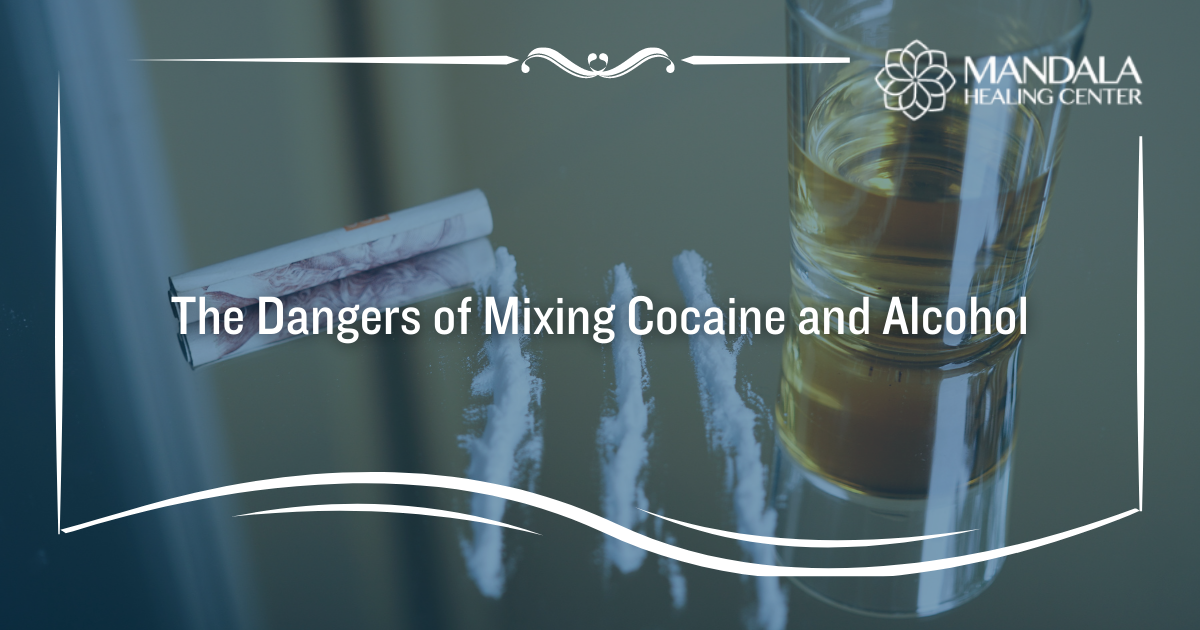Polydrug use is extremely dangerous because abusing one substance almost always enhances the toxic effects of another. Two of the most commonly combined substances are cocaine and alcohol. Many people believe that mixing cocaine and alcohol will help them stay awake longer, be able to drink more, and avoid the negative side effects of each substance. However, this simply is not true. Using these two substances together can lead to lasting side effects that substantially decrease a person’s quality of life.
Side Effects of Cocaine
Cocaine is a powerful stimulant drug that comes in the form of a white powder and can be snorted, smoked, swallowed, or injected. Shortly after using the drug, people may experience:[1]
- Increased energy
- Anxiety
- Paranoia
- Mood changes
- Increased body temperature
- Rapid heart rate
- Increased focus and mental alertness
- Dilated pupils
- High blood pressure
- Heart palpitations
- Cocaine cravings after the drug wears off
- Increase in risk-taking behaviors
Side Effects of Alcohol
Alcohol is a depressant substance with some stimulant characteristics. In high doses, alcohol intoxication can cause:[2]
- Slowed reaction times and reflexes
- Loss of coordination
- Blurry vision
- Memory loss
- Slurred speech
- Blackouts
- Dehydration
- Nausea and vomiting
- Impaired judgment
- Depression
- Increase in risk-taking behaviors
Why Do People Combine Cocaine and Alcohol?
More than 20% of people who seek help for cocaine addiction also meet the diagnostic criteria for alcohol use disorder.[3] Although cocaine and alcohol produce different effects on the mind and body, they share some characteristics. For example, both substances are often associated with nightlife, partying, and clubs. Since both substances are available in similar settings, people are more likely to combine the two.
Another reason why people use cocaine and alcohol together is due to the belief that since one substance is a stimulant and the other is a depressant, mixing the substances will alleviate the negative side effects of each. It is a common idea that using cocaine can allow people to drink more or stay coordinated while under the effects of alcohol. People may also use cocaine so they can stay awake while still feeling intoxicated.
Since cocaine is a stimulant that increases focus, some people believe that combining it with alcohol will help them sober up. After mixing the substances, individuals may drive, operate machinery, or engage in other potentially harmful activities with a false sense of security. Cocaine doesn’t help sober them up–it actually makes them even more impaired.
What Happens to the Body When People Mix Cocaine and Alcohol
Mixing cocaine and alcohol can result in higher levels of impulsivity and risk-taking behaviors, while also reducing one’s inhibitions. Individuals may also have memory problems and reduced cognitive function, so they may not be fully aware of the activities they are participating in. Physical side effects of mixing cocaine and alcohol include:
- Increased blood pressure and heart rate
- Heart palpitations
- Breathing problems
- Cognitive impairment
- Loss of motor function and coordination
Combining the two substances also increases the health risks of each drug as both drugs have higher toxicity when combined. This is because both substances are metabolized in the liver and are turned into a substance called cocaethylene, a byproduct that can temporarily enhance the highs produced by both drugs.[4]
Alcohol slows down the metabolization of cocaethylene. As a result, repeated cocaine and alcohol use can lead to a build-up of cocaethylene in the liver and cardiovascular system.
Dangers of Mixing Cocaine and Alcohol
A buildup of cocaethylene in the body is extremely dangerous. Not only is it more toxic than cocaine or alcohol used individually, but it also stays in the body longer than the substances do when taken individually. This can lead to a variety of adverse side effects, including:[5]
- Toxicity to the heart, liver, and other vital organs
- Stroke or blood clots due to high blood pressure, increased heart rate, and shrinking blood vessels
- Heart-related problems such as abnormal heart rhythms, cardiomyopathy, cardiac arrhythmia, or heart attack
- Violent or aggressive behavior
- Psychological issues such as paranoia, hallucinations, unclear thinking, anxiety, and depression
- Increased risk for overdose, injury, and emergency room visits
- Increased risk for developing addiction and physical dependence
- Seizures
- Sudden death
Both alcohol and cocaine use during pregnancy can have negative side effects on both the mother and the fetus. Using these substances while pregnant may cause:
- Low birth weight
- Premature birth
- Developmental problems
- Problems with learning, emotions, and attention span
- Miscarriage
- Stillbirth
Find Help for Cocaine and Alcohol Abuse
Habitually using cocaine and alcohol together, for any reason, is a sign that you have a problem with substances. Even if your life hasn’t been affected, continuing to abuse substances will cause devastating and life-long consequences. If you or a loved one have been abusing cocaine and alcohol, it’s time to get help.
Here at Mandala Healing Center, our complete treatment program consists of detox, individualized care, and aftercare planning. We can help you successfully overcome your addictions and live a healthier, more fulfilling life. Contact us today to get started.
References:
- https://www.drugabuse.gov/publications/research-reports/cocaine/what-are-short-term-effects-cocaine-use
- https://www.ncbi.nlm.nih.gov/pmc/articles/PMC3307043/
- https://www.emcdda.europa.eu/system/files/publications/11364/20191724_TDAT19001ENN_PDF.pdf
- https://pubmed.ncbi.nlm.nih.gov/9243342/
- https://onlinelibrary.wiley.com/doi/pdf/10.1111/j.1553-2712.2001.tb01296.x












